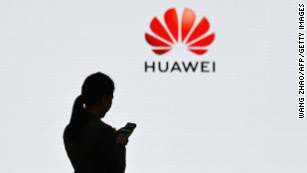Mobile networks are suspending orders for Huawei smartphones

Image collected
Mobile networks in Asia and Europe are suspending orders for Huawei smartphones following the US decision last week to restrict the company's access to American technology.
The inclusion of Huawei on an export blacklist means the Chinese company can no longer source software or components from US suppliers without a license. Existing devices are unaffected but the restrictions threaten future Huawei products and its leading position in building super-fast next generation 5G networks.
Vodafone (VOD), the world's second largest mobile operator, said Wednesday that it had paused pre-orders in the United Kingdom for the Huawei Mate 20X (5G) smartphone.
"This is a temporary measure while uncertainty exists regarding new Huawei 5G devices," a company spokesperson told CNN Business.
The United Kingdom's biggest carrier, EE, is also delaying the introduction of Huawei's new smartphones. The company had touted the Mate 20X in a preview of its 5G network last week.
Japan's top mobile operators took similar steps against another device, the Huawei P30 Lite, earlier on Wednesday. The phone was scheduled to launch in the country later this month.
Leading Japanese telecoms firm NTT Docomo (DCMYY) announced that it has stopped taking reservations for the phone, and is "looking into the impact of the US restrictions," Docomo spokesperson Yoshikumi Kuroda said.
The suspension of orders is the first tangible evidence that the Trump administration's latest escalation of its campaign against Huawei on grounds of national security is hurting the company's business.
Huawei overtook Apple (AAPL) last year to become the world's No. 2 smartphone brand behind Samsung, and it relies on markets outside of China for half of its sales.
The US export ban has forced Google (GOOGL) to cut Huawei's new devices off from its Android ecosystem. A temporary reprieve by the US Commerce Department allows Google to service existing Huawei devices for the next 90 days.
"We are looking into how big the impact is and decided to postpone the sales," KDDI spokeswoman Reiko Nakamura said.
SoftBank is assessing "whether we can sell the products to our customers with no worries," spokesperson Yusuke Abe said. "Given the situation ... we have decided to delay the sales," Abe added.
The EE spokesperson said the company was working with Huawei and Google and added that the company would provide updates on future smartphones in due course.
"We value our close relationships with our partners, but recognize the pressure some of them are under, as a result of politically motivated decisions," a Huawei spokesperson told CNN Business.
"We are confident this regrettable situation can be resolved and our priority remains to continue to deliver world-class technology and products to our customers around the world."
Like 85% of the world's smartphones, Huawei devices run on the Android operating system and access popular apps and services like Gmail, YouTube and Google Maps.
The loss of the Google ecosystem makes Huawei devices a lot less attractive to international consumers. They would lose the Android operating system and access to the Google Play app store. Moreover, third party apps like ride hailing and food delivery platforms rely on services like Google maps. Those apps would not function on a phone cutoff from Google services.
Source: https://edition.cnn.com
Previous Story
- Can Huawei make a phone without US parts?
- Trump’s Huawei ban also causing tech shocks in...
- The two most anticipated foldable phones are starting...
- Foldable phone race heats up as Google enters...
- Pixel Schmixel: How Google's phone can escape its...
- Huawei’s phone sales are ballooning while Apple and...
- Why Huawei's Folding Phone May Also Be Delayed...
- Feature: Huawei plants seeds so technology can blossom...